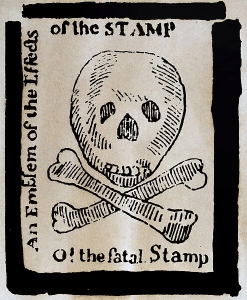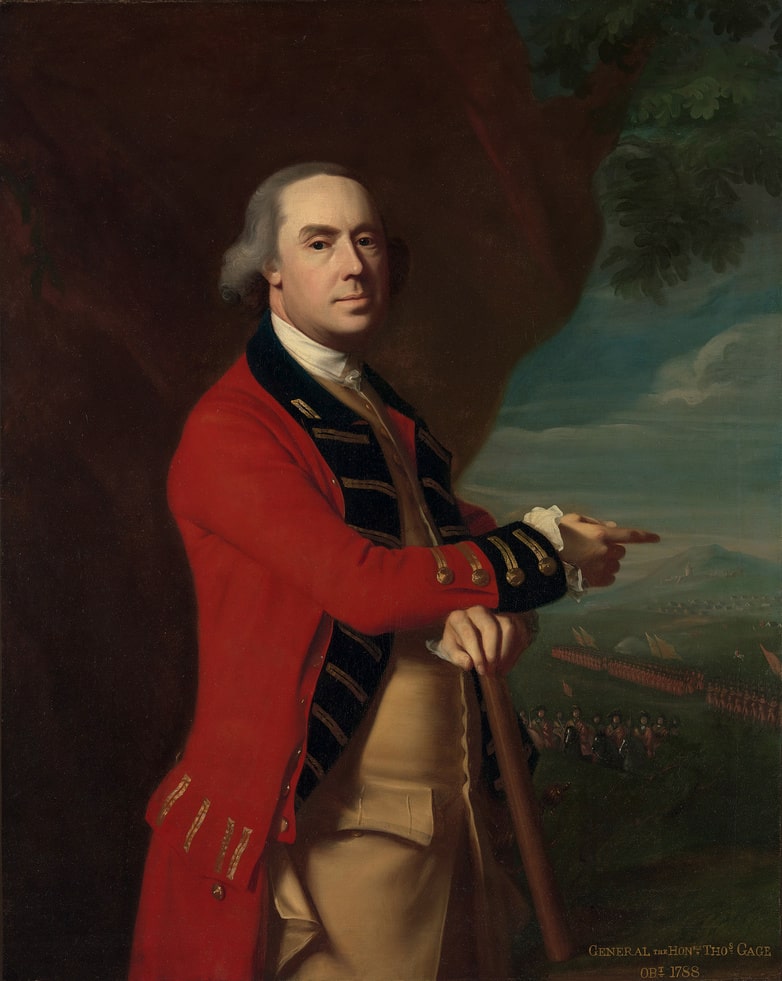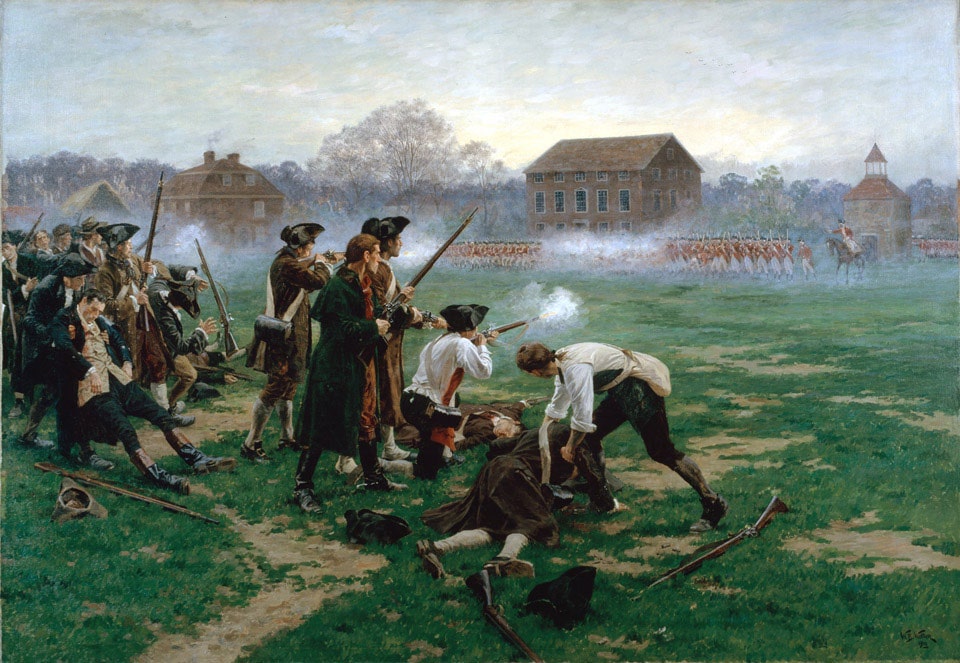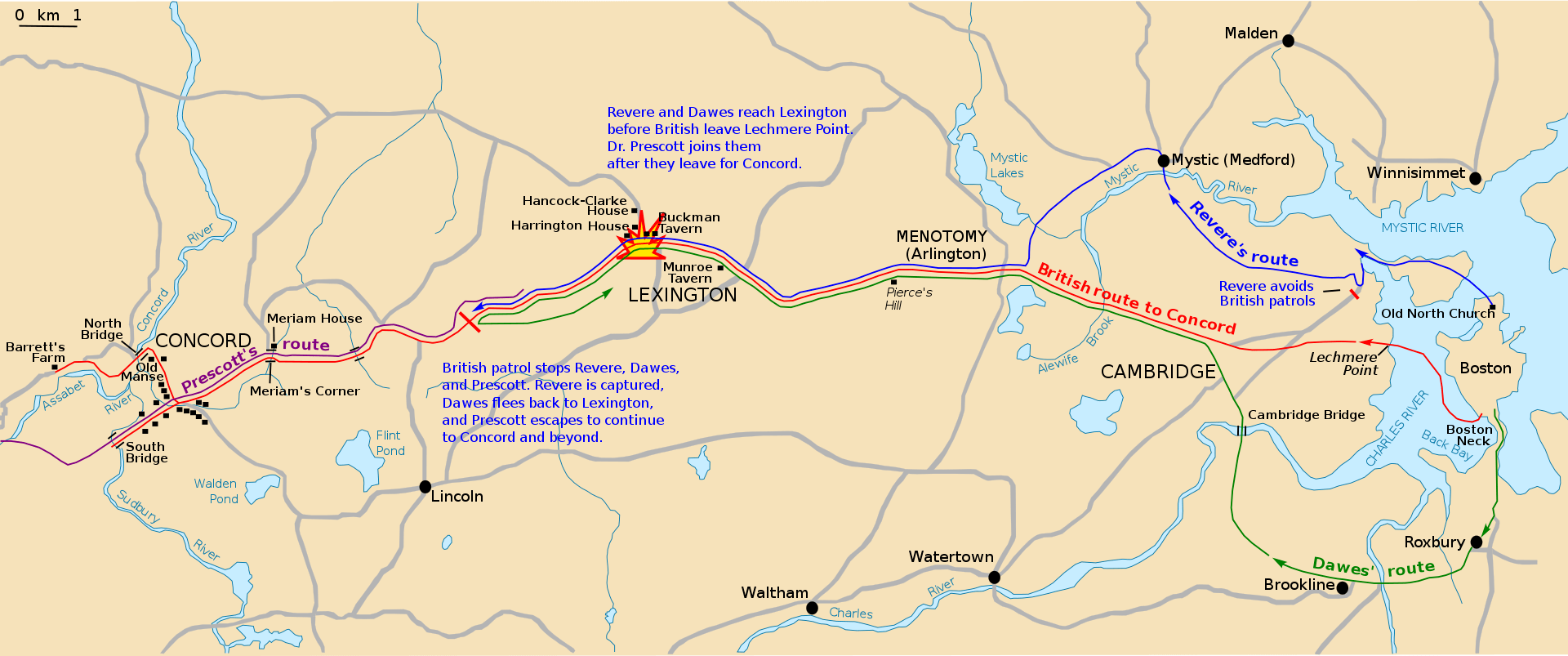Contents
Contents
The Battle of Lexington and Concord was fought on April 19, 1775, and marked the beginning of the American Revolutionary War.
Context
In the spring of 1775, conflict between the British government and American colonists was coming to a head.
Over the previous decade, the British gradually began implementing new taxes and other laws in the Thirteen Colonies, which upset a significant proportion of the local population.
This began with the Stamp Act in March 1765, which introduced new taxes on paper products and other goods. In response, the colonists protested, claiming that “taxation without representation” was unjust.

Escalations between the two sides continued with the Boston Massacre in March 1770, and the Boston Tea Party in December 1773.
The British responded harshly to acts of colonial rebellion, such as by passing of the Coercive Acts, which led many Americans to join the Patriot cause. In 1774, organizations such as the Sons of Liberty began to organize armed resistance groups, preparing for the possibility that they would need to fight back against British overreach.
However, many colonists still held strong loyalties to the British Crown. Delegates at the First Continental Congress in September 1774 believed that the situation could be resolved peacefully, voting to send a petition to King George III, which was ignored.
With tensions between Patriots and Loyalists escalating, both sides prepared for the possibility of armed conflict.
Leadup
In April 1775, Thomas Gage, the Royal Governor of Massachusetts, decided to seize a colonial powder battery, containing explosives and arms, located in Concord, Massachusetts.

He ordered Lieutenant Colonel Francis Smith to march on Concord from Boston, and seize the colonists’ weapons. However, the Sons of Liberty caught wind of the plan.
The Patriots quickly moved the majority of their weapons out of Concord, but still wanted to protect their communities from British search and seizure operations.
Upon learning on April 18 that the British Army planned to march the next day, Paul Revere rode overnight from Boston to Lexington, to warn the Patriots of the impending advance.
Summary
The British Army arrived in Lexington early on the morning of April 19. Thanks to Revere’s efforts, the Patriots were ready for their advance.
In total, 700 British Army Regulars marched on Lexington. They faced a combined force of initially around 500 Patriot militiamen, though their numbers increased well into the thousands as the battle unfolded.
The British unit, commanded by Major John Pitcairn, encountered a smaller group of 80 Patriot fighters at Lexington Battle Green. The rebels were led by Captain John Parker, a farmer from Lexington.
A tense standoff followed, which was soon broken by the “shot heard ’round the world,” officially beginning the Revolutionary War. It is unknown which side fired first.

A skirmish ensued, with the British firing a volley that killed eight militiamen and wounded 10 more. One British soldier was also wounded.
Outnumbered, Parker’s men dispersed and retreated, with some joining other rebel troops at North Bridge, just north of Concord. The British pushed on into the town, searching for weaponry and other rebel supplies to seize.
The British located a small number of gun carriages at Concord, and set them alight. Seeing the smoke, the militiamen believed that the Redcoats were torching the town, and advanced on Concord from North Bridge.
This time, the British were outnumbered, and retreated the way they came, before marching back towards Boston.
Meanwhile, the Patriot forces were bolstered by local men who heard the commotion, and decided to join in the fighting.
The British eventually made it back to Boston, facing the threat of rebel gunfire along the way. They failed to seize or locate significant numbers of Patriot weapons during the operation.
In total, the American forces suffered 49 killed, 39 wounded, and 5 missing. The British Army suffered 73 killed, 174 wounded, and 53 missing.
Significance
The British Army thought that they would be able to easily control any violent resistance that occurred in the Thirteen Colonies. However, the Battle of Lexington and Concord proved that any fighting would be a much closer matchup than initially expected.
In April 1775, colonial resistance was made up of essentially ragtag militia groups, who used whatever weapons they had available.
While many of the fighters had recent combat experience during the French and Indian War, they had little in the way of command or military structure – the Continental Army would not be created for another two months.
By contrast, the British Army was a well-oiled fighting machine, backed by the most powerful country in the world at the time, and its global empire.
Therefore, the result of the Battle of Lexington and Concord provided a significant boost to Patriot morale, giving the colonists the belief they could take on the British Army, and leading to an increase in the number of men willing to fight for the Patriot cause.
Though the loss was not significantly damaging to the British Army, it was an embarrassing defeat given the disparity in resources, training, and leadership between the two sides.
Facts
- The American forces were known as “minutemen” – they volunteered for short-term duties due to the fact that most had day jobs as farmers or tradespeople, and had to be ready to fight at a minute’s notice.
- As it neared Boston, the British retreat became increasingly disorganized and chaotic. Redcoat troops faced the constant threat of snipers and ambushes, and lost 73 killed and 173 wounded during the return journey on Battle Road.
- After making it back to Boston, the British Army soon found itself surrounded by nearly 20,000 Patriot militiamen, who volunteered to fight the British from all across New England.
- The phrase “shot heard ’round the world” originated from the poem Concord Hymn written by Ralph Waldo Emerson in 1837.
- During his midnight ride, Paul Revere did not make it to Concord – he was captured by the British at a roadblock on the way from Lexington. However, during the night, he warned dozens of other Patriots of the incoming advance, many of whom set out on horseback themselves, and spread the message to Concord and beyond.
- At Lexington, Captain Parker is quoted as saying, “Stand your ground; don’t fire unless fired upon, but if they mean to have a war, let it begin here.” According to him, when the British Regulars marched on Lexington, he ordered his men to disperse, but instead the British fired on them unprovoked.


